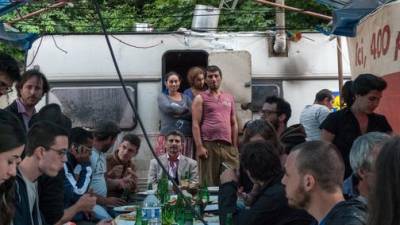A number of critics have argued that the critical potential of art and the figure of the artist has been co-opted and neutralised as culture becomes an expedient resource in the management of publics on a global scale (Yudice 2004, Holmes 2004). This paper argues that there can be pedagogical value in recognising the inevitable conflict and tension in international cultural and educational exchanges and making this it apparent through a collective dialogical process. It takes as an example Nine Urban Biotopes (9UB), an international, socially engaged art project funded by the EU Culture Programme, delivering artistic research and cultural exchange in seven cities across South Africa and Europe in 2014. This transdisciplinary project brought together academics and practitioners and experts in participatory and socially engaged art, architecture and housing, to work in collaboration exploring the challenges of urban sustainability, (including he sustainability of cultural commissioning itself). Local 'biotopes', consisting of cultural partners, and smaller NGO's, hosted visiting arts practitioners who responded to issues of regeneration and development, community safety, migration, housing, and economic subsistence in the thick of life, at the local level in each city. The creative practitioner occupied a nodal point 9UB's multi-layered network at which the multiple expectations and investments and meta and micro-agendas of hosts, local participants, coordinating and funding partners came together. Drawing on Mouffe's (2007) theories of agonistic pluralism this paper examines the role of the academic partner and the visiting artist practitioner in order to critically examine the inevitable antagonisms inherent to participatory work and international cultural exchange.
15 minute paper by Alison Rooke (Goldsmiths) and Christian von Wissel (Goldsmiths).
Session two (parallel panel two): 14.00 - 16.00, Thursday 17 September, Darwin Building B12/B15.
Image: Nine Urban Biotopes dialogue meeting in Saint Denis, Paris.
 Close
Close


